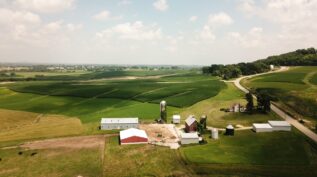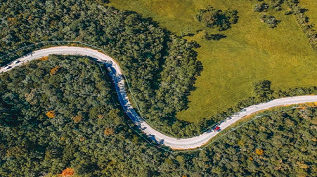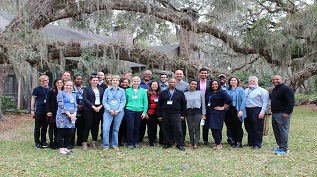
How does rural philanthropy differ from urban foundation work? The answers lie in both tactics and cultural context. Much urban philanthropy is focused on the development and implementation of large scale best practice models around specific issues – e.g. health, education, early childhood development. These grants are made to large staffed non-profits intended to reach thousands if not tens of thousands of participants. The funders often dictate the specifics of the models and the outcomes. Essentially, the funder is contracting for results.
The best rural philanthropic work is fundamentally different. The emphasis is on the place and not on one specific issue or intervention. This reflects how people live and work in rural communities – often wearing multiple hats concurrently, such as a teacher, pastor, coach and civic committee chairperson. There may not be large well-oiled nonprofits to serve as grantees. Instead, funders look to alternative anchor institution grantees like libraries, community colleges or parks and recreation departments and work closely with smaller non-profits that can do the job but need extra support in order to expand their services and influence. Similarly, the scale of the work is necessarily different. While the numbers might be small, the opportunity to do transformational work is significant given the ability to penetrate deeply into the communities’ various systems and networks.
(Source: Family Funders – Always Important in Rural Communities by Allen Smart)
Interested in learning more about this topic alongside your peers? Consider signing up for NCFP’s Rural Funders Peer Network.
Start Here: Perspectives from the NCFP Network


Three Simple Ways for Funders to Make Their Rural Work Authentic
Blog Post
Family Funders: Always Important in Rural Communities
Blog Post
Dedicated Community Drives Socioeconomic Change in the Rural South
ArticleFunder Networks and Resource Centers
Center on Rural Innovation: The Center on Rural Innovation (CORI) is a 501(c)(3) nonprofit organization partnering with rural leaders across the country to build digital economies that support scalable entrepreneurship and lead to more tech jobs in rural America.
Center for Rural Strategies: The Center for Rural Strategies publishes information about rural issues, works with press to assist them in the coverage of rural topics, and works with a wide range of partners to build a stronger voice on behalf of rural communities.
Community Strategies Group (The Aspen Institute): Since 1985, the Aspen Institute Community Strategies Group (CSG) has been committed to equitable rural prosperity. CSG works towards a future where rural communities and Native nations are places where each and every person belongs, lives with dignity, and thrives.
Integrated Rural Strategies Group (Neighborhood Funders Group): The Integrated Rural Strategies Group exists to: support and grow rural organizing; further the work of creating deep democracy in rural areas; facilitate a transition to working economies that are ecologically resilient and sustainable; and protect land, water, air, and soil for generations to come.
Partners for Rural Transformation: Partnership for Rural Transformation strengthens local economies — generating local wealth that sticks — and builds power among those living in some of the most disinvested parts of the country.
Rural Development Initiatives: The Rural Development Initiative is a regional rural development hub organization working hand-in-hand with communities to strengthen rural people, places, and economies in the Pacific Northwest.
Rural Funders Group (Philanthropy Northwest): Philanthropy Northwest hosts a monthly virtual convening of rural funders from across the country to discuss topics and learn best practices alongside peers who serve rural communities.
Rural Investment to Protect Our Environment: RIPE (Rural Investment to Protect our Environment) is a coalition of farmers, ranchers, and agricultural trade association representatives advancing a national dialogue for bipartisan, comprehensive, common-sense climate policy that integrates fair and forward-looking agricultural solutions. Several foundations active in the NCFP network have provided funding support for this network.
Rural LISC: Rural LISC is committed to providing support for rural communities, making them good places to live, work, do business and raise children. Rural LISC is dedicated to building the capacity of local nonprofit community organizations and increasing their production, by generating resources and investing in their work. Read about the T.L.L. Temple Foundation’s use of the Rural LISC model.
Rural Philanthropy Institute: The Rural Philanthropy Institute brings practitioners, academics, and interested people together to develop data, share stories and experiences, and gain insights that offer a greater understanding of what’s required to have a healthy community in rural areas.
Startup Colorado: Colorado’s rural entrepreneurs are building some of the most exciting business opportunities in the state. Startup Colorado supports these change agents via a free online Entrepreneur Network, Direct Funding for Entrepreneurs & Ecosystem Builders, Events & Programming, and collaboration with local business support organizations.
Texas Rural Funders: Texas Rural Funders (TRF) is dedicated to working with rural communities to develop and implement solutions to the unique challenges they face. TRF members are committed to the long-term success of the state and together, and together bring a breadth of experience, resources and influence that none could provide alone.
West Virginia Community Development Hub: The Hub’s purpose is to coach volunteer community leadership teams to help them build sustained development in rural communities, and grow the overall community economic development system in West Virginia through collaborative partnerships that use innovative approaches to address systemic challenges for rural development.
Staying Up to Date on Rural Issues: Newsletters and Online Newspapers
Consider signing up for newsletters from one or more of the below sources for timely updates and trends:
The Daily Yonder: The Daily Yonder provides news, commentary, and analysis about and for rural America.
High Country News: High Country News mission is to inform and inspire people to act on behalf of the West’s diverse natural and human communities.
Native News Online: Native News Online delivers important daily news that affects the lives of Native Americans nationwide.
Reports and Webinars on Philanthropy's Role in Rural Communities
Investing in the Black Rural South to Enable Social Mobility Nationwide (Center for Effective Philanthropy, 2023): In recent years, many funders have devoted more attention to elevating economic mobility for Black Americans, who continue to face substantial barriers compared to their white counterparts.Yet the Black rural South — the 200 rural counties in the South with Black populations of 25 percent or more — remains mostly overlooked.
Giving for Rural Communities (Inside Philanthropy and PhilanthropywoRx, 2023): This report offers a look at the types of funders practicing rural funding, shares examples of some of these funders, how larger funders can offer support to rural communities, and provides an overview of some of the biggest issues rural Americans face today.
Broadening Authentic Leadership: Student Action with Farmworkers (Aspen Institute Community Strategies Group, 2023): Case study on how rural-serving organizations can effectively welcome and truly empower leaders from all backgrounds.
Understanding Collective Impact in a Rural Funding Collaborative: Collective Grantmaking In Appalachian Ohio (The Foundation Review, 2016)
Principles for Rural Philanthropic Engagement (United Philanthropy Forum, 2022): These principles were developed by the United Philanthropy Forum’s Working Group on Rural Equity.
The Power Of Innovation In Rural America (Forbes, 2022): Structurally, investment and innovation are reserved for urban regions, seen as more profitable and self-regenerative. Learn more about how Partners for Rural Transformation and its six steering Partners are dispelling this myth through various strategies and programs to innovate communities and strengthen their local systems.
Mapping Rural America’s Diversity and Demographic Change (Brookings, 2021): The release of 2020 Census population data provided much-anticipated insight into the demographic trends reshaping our nation, but it also unleashed a wave of predictable headlines touting the demise of “shrinking rural America.” While this narrative provides an easy way to think about America in binary terms, it obscures the far more complicated trends shaping rural America: most notably, its growing demographic diversity over the last decade.
Debunking Three Myths about Rural America (Urban Institute, 2020): To improve the accuracy and relevance of rural reporting, journalists and researchers can eschew rural myths, represent the diversities of rural places, and focus on rural-specific experiences with issues common to all communities. In this article, the authors debunk three myths about rural America and provide recommendations for reporters and researchers engaging rural communities during the 2020 election cycle and beyond.
The ‘Rural-Urban Divide’ Furthers Myths about Race and Poverty—Concealing Effective Policy Solutions (Brookings, 2020): There is a popular narrative about “two Americas”, that presents two societies so fundamentally opposed they barely belong to the same world, framing urban America as diverse, educated, and economically productive and rural America as white, dependent on dying industries, and characterized by stagnation, decline, and despair. The binary-based narrative is not only inaccurate, but has potential to inflict real harm in four distinct ways that are discussed in this blog post.
Three Serious Myths About Rural Entrepreneurship (SourceLink, 2017): What can be done to better surround rural entrepreneurs with the resources they need to grow? This report takes on three myths of rural entrepreneurship to see how barriers to growth can be removed.
Racial and Ethnic Diversity of Rural Population Grows by Nearly 20% (The Daily Yonder, 2022): The size of the rural White population declined in the last decade while non-White population increased. The combination created a substantial increase in the share of the rural population that is Hispanic, Black, Indigenous, or some other race.
Bridges to Collective Vision (Gates Family Foundation, 2019): This case study describes the efforts and lessons learned from a collaboration of Colorado foundations currently investing in collective impact initiatives aimed at addressing the root causes of inequity in rural communities.
Building resilient rural places: Strategies from local leaders to strengthen rural assets, diversity, and dynamism (Brookings Institution, December 2020): This research series argues that our attention should not be focused on an outdated, inaccurate image of rural America, but rather on understanding, sustaining, and investing in the hyperlocal strategies already working to bring growth and equity to increasingly diverse and dynamic rural areas.
Five lessons for successful place-based philanthropy in rural communities (AEI, 2021): Philanthropies that have invested in rural communities offer five lessons on how to engage and what to expect.
How Can We Secure Enduring Capital for Equitable Rural Prosperity? (Aspen Institute, 2021): This funder briefing paper offers a call to action to restructure and reorient public, private and philanthropic capital in ways that increase their impact across rural America.
How Philanthropy Can Strengthen Rural Communities (Arabella Advisors, 2019): Although one in five Americans live in a rural area, only 6 percent of foundation grants target such communities. Rural areas also tend to be overlooked by funders seeking to tackle systemic racism and advance more equitable outcomes for all, despite the fact that immigrants and people of color comprise nearly one-fourth of rural populations.
Investing in Rural Prosperity (Federal Reserve Bank of St. Louis, 2021): This book seeks to help rural individuals and communities achieve shared economic prosperity. By outlining a framework for how to approach rural development successfully and showcasing stories of progress in different communities—as well as highlighting recommendations for action by policymakers, practitioners, funders and researchers—the editors and authors hope to advance this important goal.
Philanthropy’s Rural Blind Spot (SSIR, Spring 2021): The most economically distressed communities are the least likely to apply for funding and the least likely to have the local resources to address inequity. Grant makers must rethink their strategies to ensure that their resources go where they will do the most good.
Rural America: Philanthropy’s Misunderstood Opportunity for Impact (FSG, 2021): FSG received funding from the Bill & Melinda Gates Foundation to develop a baseline summary on rural issues and implications for philanthropy. This document is organized around the following questions that guided FSG’s research: What is rural America? What are the root causes of the challenges that rural areas face? Who is working on rural issues? What are the implications for philanthropy
Rural Development Hubs: Strengthening America’s Rural Innovation Infrastructure
Rural Funders Urge Philanthropies to Let Communities Lead the Way: Philanthropies that focus on rural communities in Colorado, Oregon and Texas say they work more through organizers and “embedded staff” and less through gatekeeping program officers. “We no longer have program officers; we have community partners,” says one foundation official.
Rural Philanthropic Analysis: The Rural Philanthropic Analysis, in partnership with Campbell University, published four field studies representing a powerful collection of stories and lessons to inform the practice of rural philanthropy in Northeast Iowa, New Mexico, Eastern Washington and New England.
State of Philanthropy in Rural Areas: This resource page from the Rural Health Information Hub notes that in 2015, the Economic Research Service (ERS) within the U.S. Department of Agriculture released a study on grantmaking trends in rural communities. This study found that rural organizations received, on average, 5.5% of total domestic grants from large foundations between 2005 and 2010.
The Path to Sustained, Impactful Rural Philanthropy (Inside Philanthropy, 2022): While there is a well-worn trail of people attempting to describe the challenges facing 21st-century rural communities, there’s far less discussion of why philanthropy is relatively absent as a source of solutions. As a point of departure, let’s eliminate the routes that inevitably lead nowhere.
The Power of Coalition Building in Rural Communities: This February 2021 Webinar, hosted by the Walton Family Foundation, explores how strong coalitions can empower social change across all sectors through shared purpose and resources. The webinar features community leaders sharing their unique experiences working with coalitions that leverage existing assets and public momentum to drive solutions and build cohesive communities.
Thrive Rural Framework Overview (Aspen Institute, 2022): The Thrive Rural Framework is a new tool to help you take stock, target action, and gauge progress on rural prosperity. The Thrive Rural Framework focuses on what needs to be true in local communities and in larger systems to produce things like shared thinking and fair-minded goals, the readiness of people and leadership to act, and the organizational structures to learn and act together.
Understanding Communities of Deep Disadvantage: This project, funded by the Robert Wood Johnson Foundation, seeks to broaden the poverty lens beyond simple income-based measures to other dimensions of disadvantage, such as health and economic mobility. The project created an Index of Deep Disadvantage that examines vulnerability in three interconnected domains (income, health and social mobility) and provides a map of this data for all counties and the 500 largest cities in the United States.
Why Philanthropy Continues to Underfund Rural America—and What Grantmakers Can Do (Inside Philanthropy, 2022): When considering disparities between rural and urban philanthropy, one thing advocates insist upon is that the issue shouldn’t be looked at as a competition between two distinct categories. While many funders tend to look at rural and urban areas as two separate, clearly divided regions, in reality, they are intertwined and interdependent.
Foundations Active in the Rural Philanthropy Space
NCFP’s network includes a growing number of family funders who are active place-based funders in rural communities. Examples include:
Ford Family Foundation: The Ford Family Foundation’s focus on connections, capacity, community-led action and creating a community building culture in rural Oregon and Siskiyou County.
Roundhouse Foundation: The Roundhouse Foundation is dedicated to supporting programs that inspire creativity, connect people with each other and their sense of place, and ensure sustainability for the long-term economic success of Oregon’s rural communities.
T.L.L Temple Foundation: The T.L.L Temple Foundation works alongside rural communities to build a thriving East Texas and to alleviate poverty, creating access and opportunity for all.
Tracy Family Foundation: One aspect of the Tracy Family Foundation’s approach to regional issues has been to directly address the rural teacher shortage and student achievement gap. To this end TFF has supported rural teacher corps initiatives at Western Illinois University (Great River Teacher Corps) and Quincy University (Grow Your Own).
Additional prominent family funders active in rural philanthropy that are not currently members of the NCFP network include:
Anschutz Family Foundation – Rural Philanthropy Days: RPD was designed to encourage foundations (concentrated along the Front Range) to travel to, and become better acquainted with, rural nonprofits and the communities they serve.
Blandin Foundation: Blandin Foundation’s mission is to be a trusted partner and advocate to strengthen rural Minnesota communities, especially the Grand Rapids area. The foundation’s vision is healthy, inclusive rural communities.
Gates Family Foundation: The Gates Family Foundation invests in projects and organizations which make a meaningful, positive impact in Colorado and enhance the quality of life for those living in, working in, and visiting the state.
Robert Wood Johnson Foundation – Rural Health and Well-Being in America: Curated collection sharing resources, research and emerging insights into the many factors that shape rural opportunity, health, and equity in America.
Patterson Family Foundation – “Rooted in Rural”: The Patterson Family Foundation is a family-led foundation extending the legacy of Neal and Jeanne Patterson. We strive to help lift up our rural communities through health care, education, economic opportunity, and beyond.
Reser Family Foundation: The Reser Family Foundation’s Small Community Initiative funds economic development and community development groups supporting Rural Oregonians.
